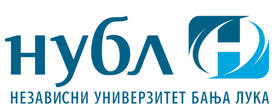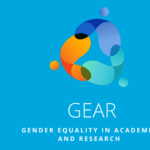PROJECT: CAPACITY BUILDING IN THE FIELD OF HIGHER EDUCATION (ERASMUS-EDU-2023-CBHE)
Project duration: 2023-2026
The Independent University Banja Luka is a co-partner in the project Gender Equality in Academia and Research – GEAR. This project has been funded with support from the European Commission. Ten institutions from five countries participate in the project, namely: University Adriatic, Faculty of Management Herceg Novi (Montenegro), Vilnius Universitetas (Lithuania), Univerza v Mariboru (Slovenia), University of Montenegro (Montenegro), Independent University Banja Luka (Bosnia and Herzegovina), Univeristy in Tuzla (Bosnia and Herzegovina), Udruzenje mladih zena GirlThing Tuzla (Bosnia and Herzegovina), Socio-ekonomski centar Crne Gore (Montenegro), Western Balkans Institute (Serbia) and University Singidunum (Serbia).
The demand for STEM (Science, Technology, Engineering, and Mathematics) experts and professionals will grow in the future given that it forms the foundation of the Fourth Industrial Revolution. Europe is facing an unparalleled shortage of women in STEM fields. Women make up 56% of the European population and make up the majority of tertiary graduates, yet only account for 1.5 out of 5 scientists and engineers. The gender gap widens as seniority levels increase, with women representing only 17.9% of full professors in engineering and technology fields, while only 10.7% of patent applications were submitted by women (from 2015 to 2018).In an increasingly complex and interconnected world, STE(A)M education and training practices have gained attention in Higher Education.
Women’s involvement in STEM studies and careers remains remarkably low in most of the Western Balkans despite the fact that 56% of enrolled students in tertiary education were female over the period 2015-18 in the region according to the RCC’s study. Only North Macedonia and Serbia have higher shares of female students in natural sciences, mathematics, and statistics subjects, outperforming all Western Balkan economies.General objective: GEAR is developed to support addressing the pressing regional societies issues stemming from gender inequality in education, science, and work and in line with recent developments corresponding to the fourth industrial revolution and regional economic development. Additionally, the project provides venues for inclusive action of the HE underrepresented women, i.e. Roma, especially in the aftermath of COVID-19 educational equality and accessibility crisis. Hence, the action addresses both quality and relevance of the HE in beneficiary communities and countries.


